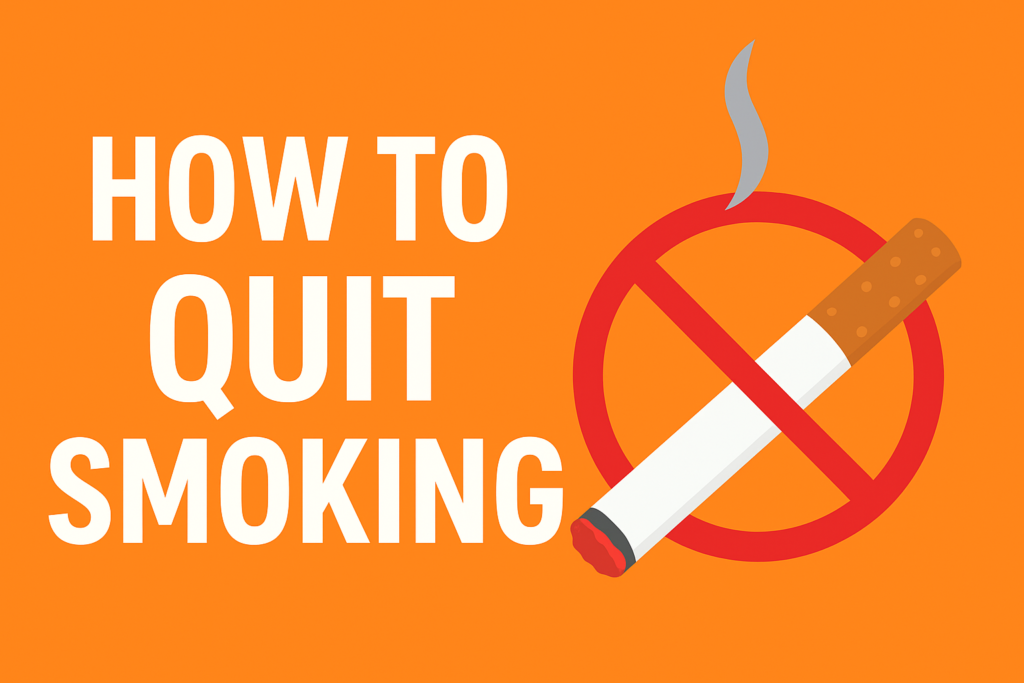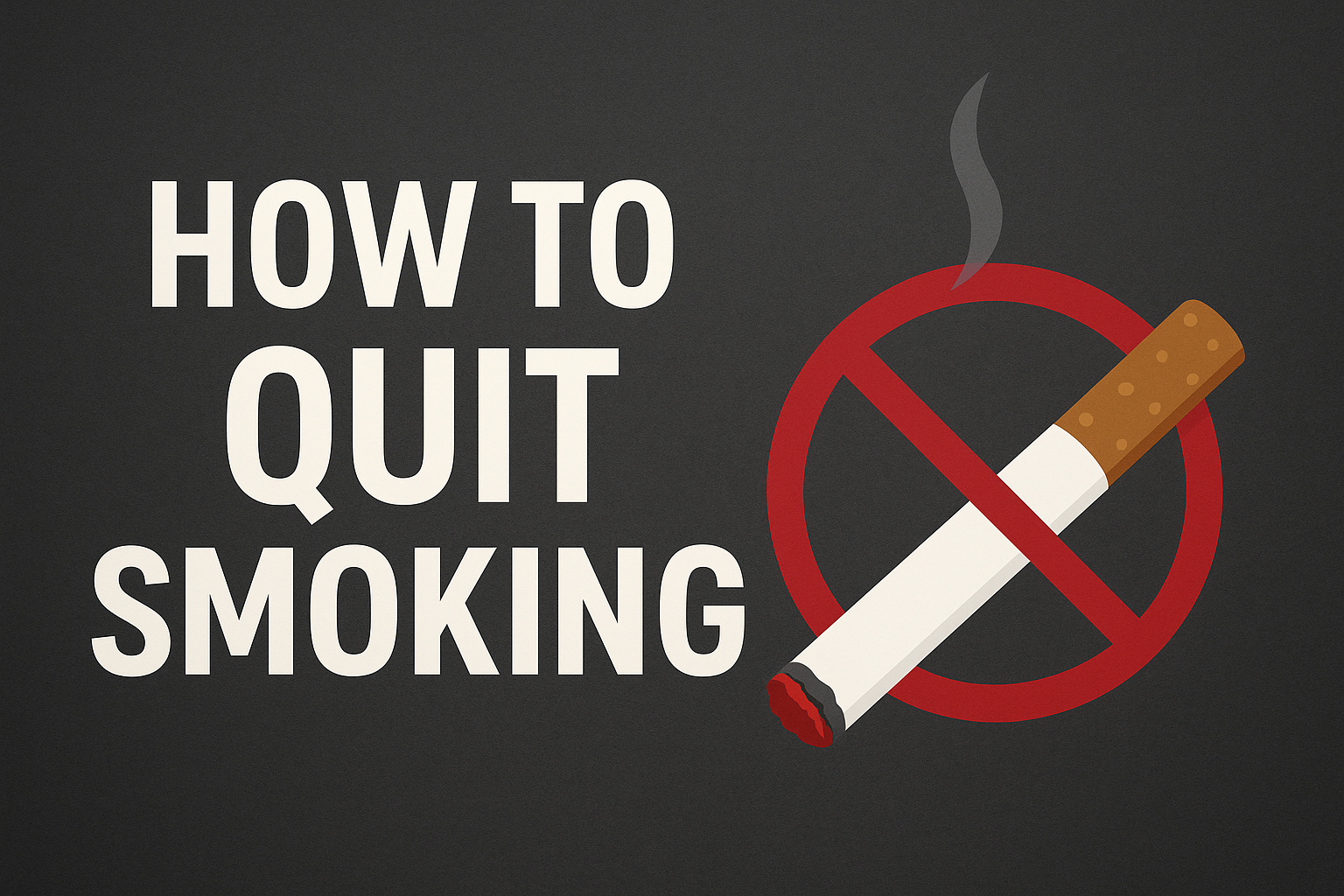Do you think that how to quit smoking ? Smoking is one of the toughest habits to break, yet one of the most rewarding when you finally quit. Millions of people around the world struggle with nicotine addiction, but the good news is—quitting smoking is possible with the right strategies, mindset, and support. Whether you’re looking for natural methods, professional help, or motivation to finally stop, this guide covers everything you need to know about how to quit smoking successfully.
Why Quitting Smoking is So Important
Before we dive into tips, let’s understand why you should quit smoking. Cigarettes contain thousands of chemicals, including nicotine, tar, and carbon monoxide, which harm nearly every organ of the body. Some major health risks of smoking include:
- Increased risk of lung cancer, heart disease, and stroke
- Weak immune system and slower healing
- Breathing problems like COPD (chronic obstructive pulmonary disease)
- Premature aging and reduced life expectancy
On the other hand, the benefits of quitting smoking start almost immediately:
- Within 20 minutes: Heart rate and blood pressure drop
- Within 12 hours: Carbon monoxide level in blood normalizes
- Within 2 weeks to 3 months: Lung function improves
- Within 1 year: Risk of heart disease is cut in half
- Long-term: Improved health, energy, and quality of life
Clearly, learning how to quit smoking is not just a lifestyle choice but a life-saving decision.
Common Challenges When Trying to Quit Smoking
Quitting smoking isn’t easy because nicotine is addictive. Many people experience withdrawal symptoms like:
- Cravings for cigarettes
- Irritability, anxiety, or mood swings
- Difficulty concentrating
- Trouble sleeping
- Increased appetite
Understanding these challenges helps you prepare better. Remember: these symptoms are temporary, but the benefits of quitting smoking last forever.
Effective Ways to Quit Smoking
Set a Quit Date and Commit to It
Pick a specific date to quit smoking and stick to it. Preparing your mind in advance makes it easier to fight cravings. Mark it on your calendar and tell your family or friends for accountability.
Keyword Tip: Set a quit smoking plan, fix a quit date, and commit to living smoke-free.
Identify Your Triggers
Most smokers light up in certain situations—after meals, with coffee, during stress, or social gatherings. Make a list of your smoking triggers and create alternative habits. For example:
- Drink water or chew gum after meals
- Take deep breaths during stress
- Choose smoke-free activities with friends
Avoiding triggers is one of the most effective ways to quit smoking naturally.
Try Nicotine Replacement Therapy (NRT)
Nicotine patches, gums, lozenges, nasal sprays, or inhalers can help reduce withdrawal symptoms. NRT provides a safer dose of nicotine without harmful chemicals in cigarettes.
Studies show that nicotine replacement therapy can double your chances of quitting successfully.
Use Prescription Medications
If you’ve tried to quit smoking before but failed, ask your doctor about prescription medications like Bupropion (Zyban) or Varenicline (Chantix). These reduce cravings and withdrawal symptoms.
Practice Stress Management
Many people smoke to relieve stress. Instead, replace smoking with healthier habits:
- Exercise regularly (yoga, walking, or gym workouts)
- Practice meditation or deep breathing
- Engage in hobbies like reading, painting, or music
These natural ways to stop smoking help your body heal and keep your mind occupied.
Keep Your Hands and Mouth Busy
One reason smoking is addictive is the hand-to-mouth habit. Replace cigarettes with alternatives:
- Sugar-free candies or chewing gum
- Carrot or celery sticks
- A stress ball or fidget toy
This simple trick helps in controlling cigarette cravings.
Build a Support System
Tell your friends, family, or coworkers that you’re quitting smoking. Their encouragement can boost your motivation. You can also join online support groups or local stop-smoking programs.
Keyword Tip: Support and accountability play a key role in how to quit smoking successfully.
Track Your Progress
Keep a journal of your smoke-free days. Use a quit smoking app to track money saved, health improvements, and cravings resisted. Reward yourself for every milestone.
Stay Positive and Persistent
Most people try multiple times before quitting for good. Don’t be discouraged by setbacks. Every attempt teaches you something new about your triggers and coping methods.
Remember: quitting smoking is a journey, not a one-time event.
Natural Home Remedies to Quit Smoking
If you prefer natural solutions, try these remedies to stop smoking:
- Green tea – helps flush toxins and reduce cravings
- Ginger and turmeric tea – reduces withdrawal symptoms
- Honey with warm water – detoxifies lungs naturally
- Chewing cloves or cardamom – keeps mouth busy and reduces urge
These remedies are safe and effective ways to stop smoking naturally at home.
Lifestyle Changes After Quitting Smoking
When you quit smoking, your body begins to heal. Support your recovery with these lifestyle changes:
- Drink plenty of water to flush out toxins
- Eat a balanced diet rich in fruits and vegetables
- Exercise daily to improve lung function
- Sleep well to reduce irritability and mood swings
These steps not only help you quit smoking permanently but also improve your overall health.
Final Thoughts: You Can Quit Smoking
Quitting smoking is challenging, but millions of people have done it successfully—and so can you. The key is to stay motivated, use the right strategies, and never give up after a failed attempt.
Remember:
- Every cigarette avoided adds years to your life
- Cravings are temporary, but the health benefits are permanent
- You are stronger than nicotine
Take the first step today. Set your quit date, prepare for the journey, and embrace a healthier, smoke-free future.
Frequently Asked Questions (FAQ)
1. What is the best way to quit smoking?
The best way is a combination of setting a quit plan, avoiding triggers, using nicotine replacement therapy, and building support.
2. Can I quit smoking naturally without medicine?
Yes, many people quit using natural remedies, lifestyle changes, and stress management techniques.
3. How long does it take to quit smoking completely?
It varies, but most withdrawal symptoms last 2–4 weeks. Long-term success depends on persistence and avoiding relapse.
4. What happens to my body when I quit smoking?
Your blood pressure normalizes, lungs heal, and the risk of heart disease and cancer decreases significantly over time.

Table of Contents
By following these strategies, you’ll not only learn how to quit smoking but also transform your life with better health, more energy, and a longer future.
